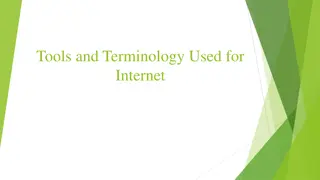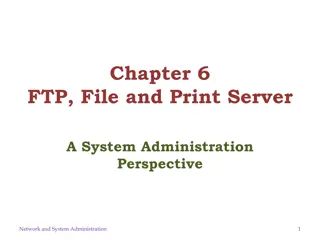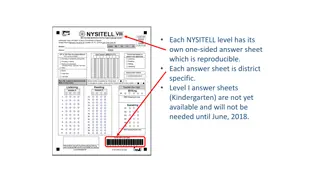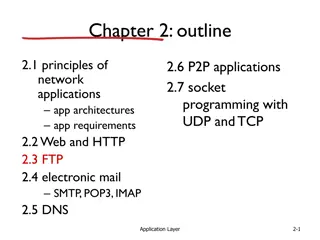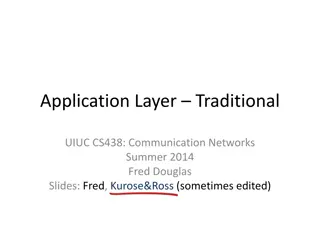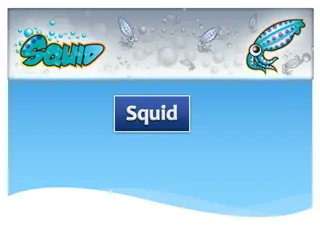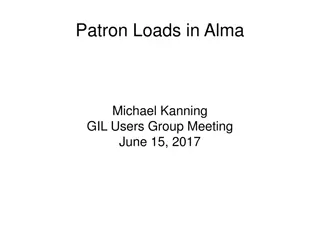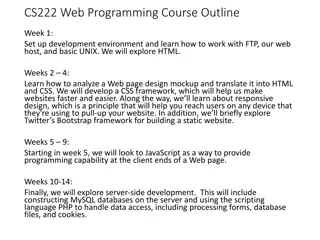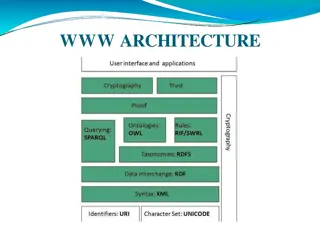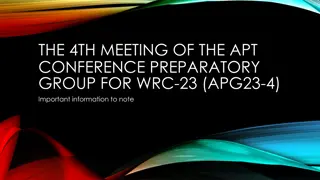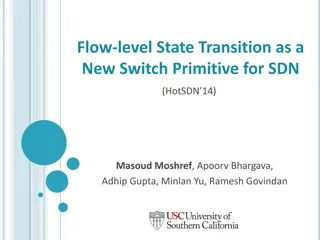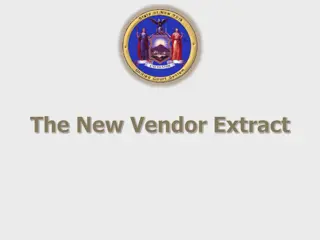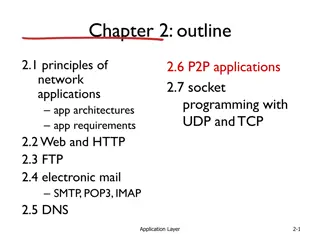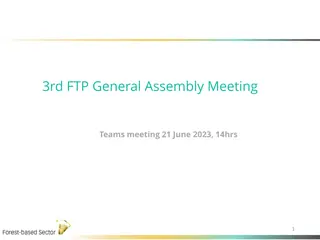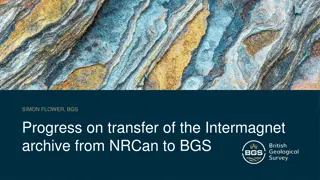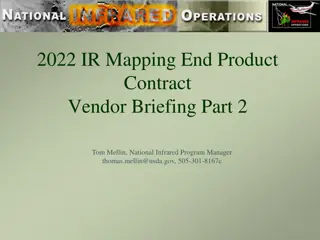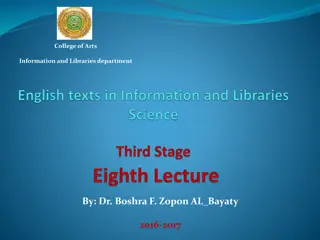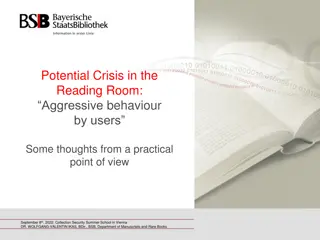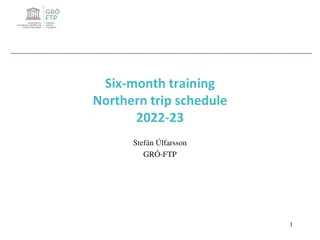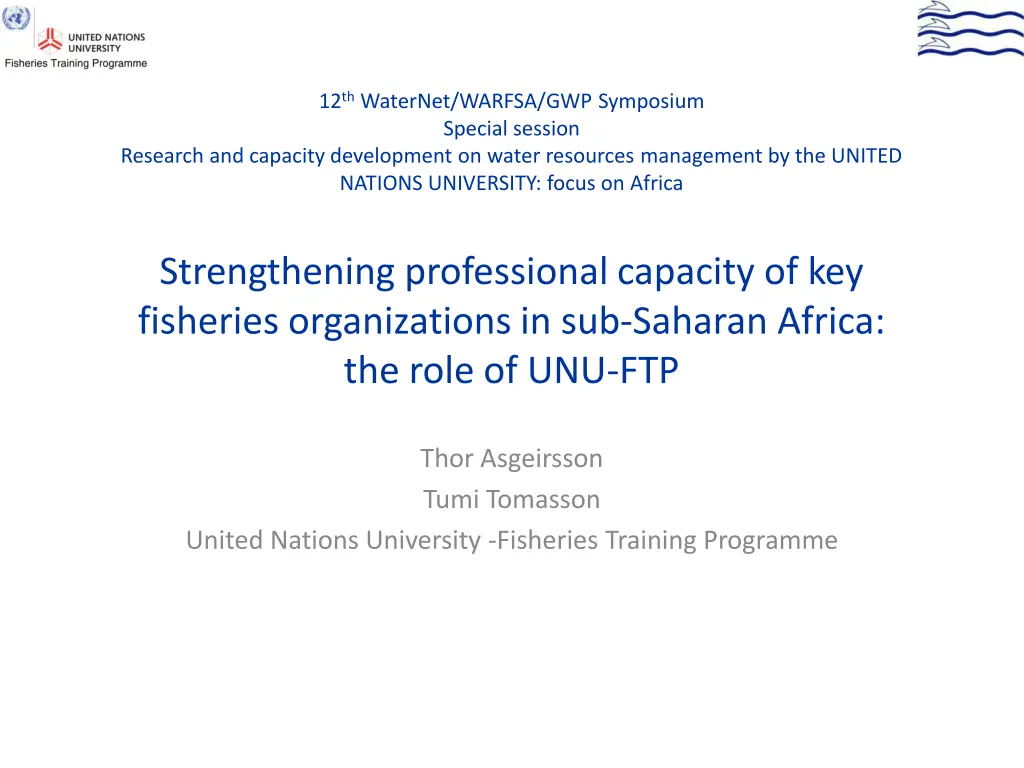
Fisheries Management Capacity Development in Africa
Explore the initiatives and challenges in strengthening the professional capacity of key fisheries organizations in sub-Saharan Africa, with a focus on research and capacity development on water resources management. Learn about the role of the United Nations University Fisheries Training Programme (UNU-FTP) in enhancing the sustainability of fisheries, aquaculture, and aquatic resources. Discover the rise of aquaculture in Africa, the dynamics of fish exports, sustainable fisheries practices, and the global context of fisheries management.
Download Presentation

Please find below an Image/Link to download the presentation.
The content on the website is provided AS IS for your information and personal use only. It may not be sold, licensed, or shared on other websites without obtaining consent from the author. If you encounter any issues during the download, it is possible that the publisher has removed the file from their server.
You are allowed to download the files provided on this website for personal or commercial use, subject to the condition that they are used lawfully. All files are the property of their respective owners.
The content on the website is provided AS IS for your information and personal use only. It may not be sold, licensed, or shared on other websites without obtaining consent from the author.
E N D
Presentation Transcript
12thWaterNet/WARFSA/GWP Symposium Special session Research and capacity development on water resources management by the UNITED NATIONS UNIVERSITY: focus on Africa Strengthening professional capacity of key fisheries organizations in sub-Saharan Africa: the role of UNU-FTP Thor Asgeirsson Tumi Tomasson United Nations University -Fisheries Training Programme
World fisheries Million tons 160 140 120 56 53 50 44 47 42 32 37 35 39 27 27 31 24 100 28 80 60 94 93 93 93 92 92 91 91 90 90 90 90 89 88 40 86 20 0 1995 1997 1999 2001 2003 2005 2007 2009 Aquaculture Capture FAO stats
Stocks utilization Of researched stocks
Catch in east and west Africa Catch (inland L.V.) of Kenya, Uganda, Tanzania Catch of major west African countries Catch (inland) of some east African countries
Net export of agriculture commodities from developing countries
Africa exporter of fish Net exported in value (million US$) over 2 billion Value: export>import Increasing demand Higher prices Quantity: export<import
Aquaculture 4-fold increase in sub- Saharan Africa 2-fold increase in Asia No increase in Europe
Sustainable fisheries whatever that means!! Ecological, sociological, and economical sustainability Better information about fisheries Catch statistics Production numbers/capacity Monitoring and Surveillance Information for fisheries management Master/strategic plan for fisheries Stronger fisheries institutes (improved capacity)
UNU and UNU-FTP Recognition of economical and ecological aspects of fisheries UNCLOS in 1982 Expansion of EEZ to 200 nm Convention on biological diversity (Rio 1992) FAO code of conduct for resp. fisheries (1995) Recognition of growing problems in fisheries Recognition of potential of fisheries for developing countries Recognition of needs to improve institutional capacity UNU-FTP was established in 1998 in Iceland
UNU-FTP activities and working environment Formal cooperation of: Marine Research Institute (host) MATIS food research institute University of Iceland University of Akureyri Fishing industry 6 months in-service training Development of short courses and conferences Scholarship programme
The 6 months fisheries training programme Institutional Capacity Building Programme In-service (6 months) applied training Post-graduate (non-degree) Key fisheries institutes/organizations Need based priority areas Research environment Cooperation in selection of candidates
UN: 2005-2014 Education for Sustainable Development UNESCO learning philosophy: the four pillars of learning UNU-FTP concepts in that environment Learning to know Lectures International communication Project Visits Cultural adaptation Learning to do Learning to live together Tailor-made studies Sharing housing cooperation Presentations Professional responsibility Learning to be
UNU-FTP Structure of the 6 month training programme in Iceland Orientation (1 week) Introductory course (5 weeks) Fellows should gain a holistic view of fisheries and be able to put their own fisheries into an international and/or regional perspective Fisheries Policy and Planning (6 weeks) Resource (stock) Assessment (6 weeks) Quality Fishing Technology (6 weeks) Sustainable Aquaculture (6 weeks) Management of Fisheries Companies (6 weeks) Management of Fish Handling and Processing (6 weeks) Fish biology Biological indicators Sampling strategy Survey design Environmental aspects of fisheries Assessment models Data poor situations Precautionary approach Catch rules Fishing methods Fish behaviour Gear design Gear material Gear selectivity Gear research Vessel structure Aquaculture systems Aquaculture research Site selection Species selection EIA Planning and monitoring Operational aspects Resource economics Project planning Policy formulation Management systems Operational planning Strategic planning Business planning Human resources Raw materials Economic analysis Accounting Fleet management Fish processing HACCP Storage /shelf life Quality indicators Sanitation Traceability Packaging Product development Project proposal Research project Final report and presentation (14 weeks) Must address important issues in fellow s home country
Number of fellows 1998-2011 Gender ratio 223 Fellows 42 countries * Fiji, Tonga, Nauru, Vanuatu, Samoa ** Belize, Barbados, Jamaica, Guyana
Short course development Technical and financial support In partner countries (cooperation) 3-10 days (highly focused) Counterparts (educational institute, FD) Training of trainers (delivered by local experts) Local ownership Involvement of former UNU fellows
Scholarship programme For post-graduate studies in Iceland Former fellows Full MSc degree support and partial (27 months) PhD degree support 2-3 per year (based on performance) Currently 6 PhD and 2 MSc
UNU-FTP in sub-Sahara countries Men Women Total (2011) MSc Sub-Saharan Countries The Gambia Cape Verde Sierra Leone Liberia Ghana Cameroon Angola Namibia South Africa Mozambique Tanzania Kenya Uganda Malawi Mauritius Madagascar Total PhD 5 3 2 2 0 1 0 5 2 7 4 9 1 4 1 0 3 0 1 3 2 4 5 2 4 0 0 0 30 6 7 3 2 3 1 1 8 4 11 9 11 18 6 4 1 95 2 2 2 1 2 2 3 1 1 1 14 6 4 1 65 2 2 2 16(6) 5/9 2/10
Specializations of African fellows 35 30 25 20 15 10 5 0 FT SA QM MFCM FPP SAq/ES Lines of specialization
UNU-FTP Countries Uganda *2009/2010/2011 Sustainable Aquaculture for Extension Officers *2011 Quality Management and Fish Processing for Fish Inspectors Tanzania *2006 Maintenance and Operation of a Database on Artisanal Fisheries *2009 Fisheries Data Collection and Analysis Namibia *2006 Workshop on Fisheries and Aquaculture in Southern Africa: development and Management *2008 Profitability Assessment in Fisheries and Aquaculture Enterprises *2011 Fish Handling and Quality Management for Deck Officers and Processors Mozambique *2008 Profitability Assessment in Fisheries and Aquaculture Enterprises *2011 Management of Small Aquaculture Enterprises Kenya *2008 Fish Inspection and Quality Control: Basic/Advanced *2009 Fisheries Data Collection and Analysis indicate the countries fellows have come from. Indicate where short courses and conferences sponsored by UNU-FTP have been held Location of the UNU-FTP
Institutional partners (short course) Mozambique: National Institute for Aquaculture Development Eduardo Mondlane University Polithecnica University Uganda: Makerere University Fisheries Training Institute Namibia: NAMFI University of Namibia Kenya: Moi University Ministries and Departments of Fisheries
UNU-FTP and sub-Sahara cooperation Over 100 trained fisheries professionals, which many cooperate cross-cultural and cross boundaries Over 100 research projects on topics of great relevance to sub-Saharan countries Leaders in fisheries 12 training courses since 2006 (directly affecting about 400 professionals) Cooperation and networking of key fisheries institutes and universities

